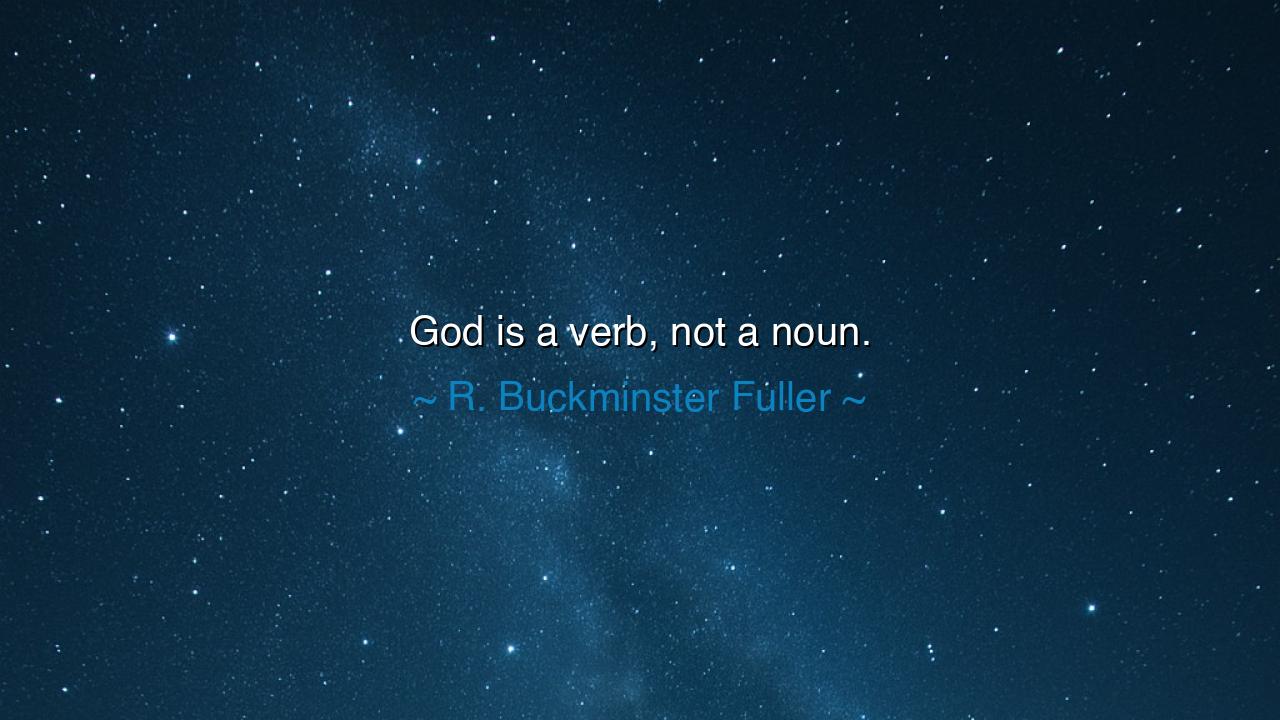
God is a verb, not a noun.






The saying “God is a verb, not a noun” comes from R. Buckminster Fuller, the visionary architect, philosopher, and inventor of the 20th century — a man whose mind bridged the worlds of science, spirituality, and human potential. In these few words, Fuller sought to awaken humanity to a new understanding of divinity as dynamic, not static; as energy, not image; as action, not concept. He saw God not as a fixed being sitting in eternity, but as the eternal motion of creation itself — the ever-flowing process through which the universe lives, evolves, and expresses purpose.
Fuller lived and thought in an age of change. He witnessed war, despair, and the misuse of technology — yet he also believed that divine intelligence was working through humanity, calling us to co-create a better world. When he said “God is a verb,” he was declaring that the Divine is not a distant noun to be described, worshiped, or defined, but an active force of becoming — the verb of creation, innovation, and love that moves through all existence. God is not “a thing” to be located; God is the act of doing, of giving, of creating order from chaos, of sustaining life itself.
In this vision, the Divine is no longer confined to temples or doctrines but found in the living processes of the cosmos. When a seed sprouts, when a child learns, when light breaks the horizon — all these are verbs of God. Fuller saw this truth mirrored in science: the laws of motion, the patterns of geometry, and the invisible fields of energy all point to a universe that is alive, continuous, and self-creating. Just as the sun does not “exist” as a static object but burns in ceaseless fusion, so too God is not being, but doing — the perpetual pulse of life that gives being to all.
This understanding also carries a spiritual challenge. If God is a verb, then faith itself must become active. It is not enough to speak of belief or to cling to symbols of holiness; one must live divinely, act with creation, and move with love. The great souls of history have understood this. Consider Saint Francis of Assisi, who did not only preach about God but lived as a verb of compassion — feeding the hungry, healing the sick, embracing lepers, and singing with the birds. His faith was not a noun in his mouth but a verb in his hands and feet. In him, the divine motion took flesh again — a reminder that God’s activity continues through human will aligned with love.
In Fuller’s worldview, this divine activity extends to the realms of human creativity and innovation. When an inventor designs something that serves humanity, when an artist creates beauty that uplifts the soul, when a community joins in harmony to build peace — there, God is at work. For God is not merely “above” the universe, but within it, unfolding through our actions. To live without purpose, to refuse creation, to act without love — this, in Fuller’s language, is to separate oneself from God’s verb, to become a noun: lifeless, motionless, detached.
The meaning, then, is revolutionary: to know God is to participate in the divine movement — to create, to heal, to love, to evolve. The Divine cannot be confined by name or dogma; it can only be experienced in the act of living rightly. Every moment becomes sacred when we understand that our choices, our kindness, our labor, and our imagination are extensions of the same energy that formed galaxies. To pray is to move in harmony with that rhythm — to join the dance of creation itself.
The lesson is this: let your life become a verb of God. Do not wait for holiness to descend; make holiness with your deeds. Speak less of divinity and live it. Create something beautiful, forgive someone you have judged, stand up where injustice reigns, nurture life wherever it falters. In every act of love, compassion, and creation, you embody the truth Fuller revealed — that God is not a distant name but the living verb that moves through all things, calling us to move with it.






AAdministratorAdministrator
Welcome, honored guests. Please leave a comment, we will respond soon